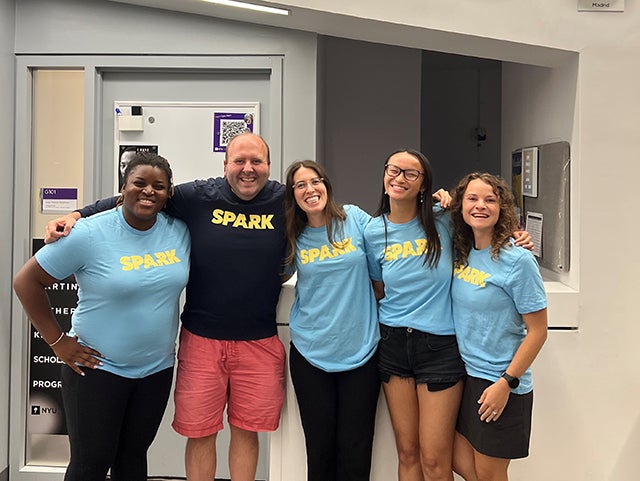 By Katie Catulle ’24
By Katie Catulle ’24
Public service is at the heart of a Harvard education. From carefully designed courses to direct community involvement, engaged scholarship is key to a transformative liberal arts and sciences education.
Travis Lovett, Assistant Dean of Civic Engagement and Service at Harvard College, always knew he wanted to pursue public service work. Now he finds joy in his role as a connector: between scholarship and community partners, between administration and practice, and between students and what is most meaningful to them.
One such connection is the new Harvard College Certificate for Civic Engagement. This new program helps students draw connections between scholarship and social good. Lovett shares his journey in public service, ways students can get involved, and how he helps students feel a bit more whole.
Why do you think it's important that undergraduates engage in public service?
Public service is core to Harvard's mission of educating citizens and leaders. We believe Harvard College students should use their talents to serve others and to use their education for the public good.
Do you see public service and scholarship as enhancing each other?
We hope that by pursuing public service, the community work provides some perspective to what's being taught in a classroom and vice versa. Our Fellows at the Forefront program is a perfect example. Faculty members lead a summer workshop. Half the students work on summer research projects while the other half work at community-based internship sites. Through the series of weekly discussion sessions, students learn from each other.
For summer 2024, we are working with Professor Jason Beckfield, doctoral student D.A. Evrard, and collaborators at the Lowlander Center in Louisiana who are focused on how tribal communities experience energy transition projects. In addition to working with the Lowlander Center, students participating in the cohort will have internships with the Environmental Defense Fund, Open Environmental Data Project, and Energy Futures Initiative Foundation.
SPARK is another example. Incoming first-year students have a chance to learn from student leaders, faculty members, and staff members. It's the ideal on-ramp for civically minded students to gain some practical experience, make a meaningful contribution to their hometown community, and also learn about the civic landscape at Harvard.
Another pathway is the Fong Family Winternship Program, which allows students to explore civic work over winter break. This past winter, 55 students worked at a range of sites including the Harvard Square Homeless Shelter, Waltham Boys and Girls Club, City of Houston Mayor's Office, ArchCity Defenders, Phoenix Legal Action Network, Refresh Bolivia, Palestine Children's Relief Fund, and LifeMoves. This program is incredibly flexible, supporting students who have developed hometown projects with SPARK, and connecting other students with organizations related to thesis projects or future career interests. It’s a way for graduating seniors to get a foot in the door, and for our students who have other summer commitments to participate in an immersive experience over break.
Could you talk a bit about the Harvard College Certificate for Civic Engagement?
It has three core components: students choose three courses that are civically focused, they undertake a 300-hour service practicum working in a community or with a community partner, and complete a capstone reflection, which helps students make meaning of their work.
We’ve been excited to set a new kind of precedent for the College. We looked at secondary fields of study and language citations as examples of ways to validate a student's civic experiences. The certificate is structured in a way that recognizes student coursework and their commitment to a community or to a community-focused issue.
Does this go beyond existing programs, like the Mindich?
The Mindich Program for Engaged Scholarship is our primary program that forges connections between coursework and community engagement. Right now, we’re engaging with our faculty to identify courses beyond the Mindich programs that engage in policy and community issues. There are places where lived experiences of community members don’t necessarily align with what a policy is intended to do. So our faculty members who teach Mindich courses are thinking through multiple methods of engagement. We’re asking all our faculty to consider interdisciplinary approaches so that the course content is civically focused.
What led you to this work? What inspires you?
I was a first-generation college student who grew up in rural Virginia. Scholarships made it possible for me to pursue higher education. Growing up, I always knew that I wanted to do humanitarian work in some capacity, and I discovered that I love working with people most. I began thinking about my role as a connector. My own path has been trying to think through how we solve problems and how we put people at the center of solutions.
Do you have advice for students on how to make time for all the different things they're drawn do?
I encourage students to think about what makes their lives feel whole. When advising students, we help them find purpose in their lives. For me, that's integrated in a lot of ways, but making time and space for the people you love is key.
How can students figure out the best way to get involved?
There are so many different ways to engage in this work. Part of what we do is simplify the ecosystem so that students can get involved with community partners that connect best with their interests. Our staff help students identify what's most meaningful to them so that they're civically active throughout their lives.
We're at a critical juncture and we face some existential challenges as a society. The work that we're doing helps us to connect with our humanity. Helping our best and brightest commit to a cause beyond themselves feels more crucial than ever.
Photo: SPARK participants with Travis Lovett, assistant dean of civic engagement and service at Harvard College